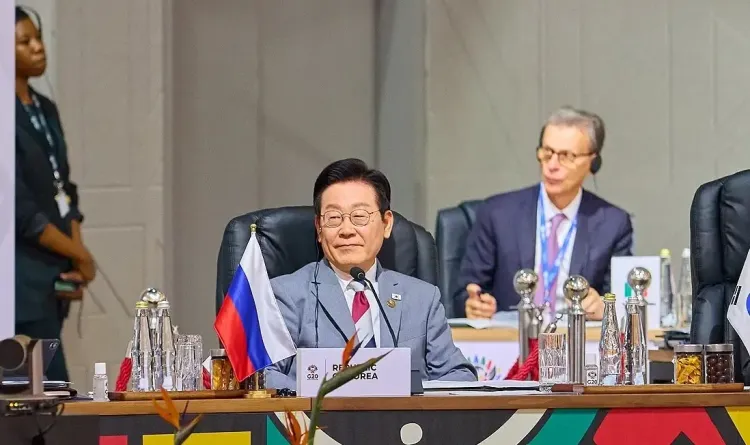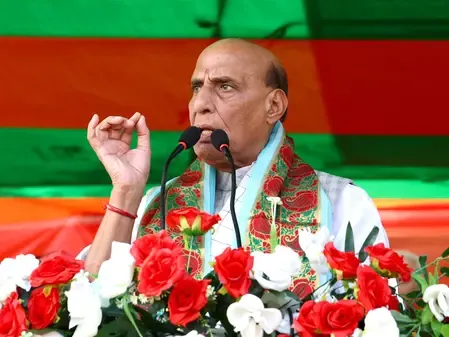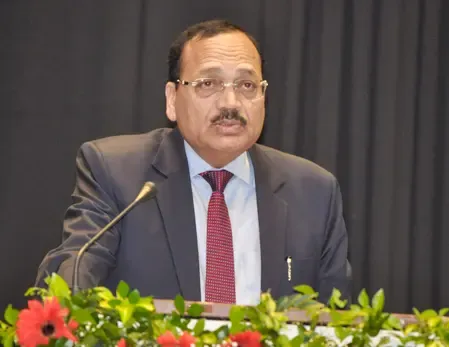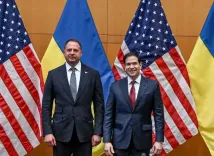How is S. Korean President Lee Advocating for WTO Revitalization at G20 Summit?

Synopsis
Key Takeaways
- Revitalization of WTO: President Lee advocates for strengthening the WTO to enhance global trade.
- Investment Facilitation: The IFD Agreement aims to simplify investment processes.
- Debt Relief: Proposals to address excessive debt burdens on developing nations.
- Green Initiatives: Commitment to reducing greenhouse gas emissions significantly.
- International Cooperation: Emphasis on collaboration for effective development projects.
Johannesburg, Nov 23 (NationPress) President Lee Jae Myung has called upon the Group of 20 (G20) nations to take action towards revitalizing the World Trade Organization (WTO) to boost global growth potential. He emphasized the necessity of establishing a stable trading and investment framework during the initial session of the G20 summit, amidst the current turmoil facing the multilateral trading system, as reported by Yonhap news agency.
"We must create a predictable trading and investment environment to enhance growth potential," Lee stated, adding, "The revitalization of the World Trade Organization is in the best interest of all nations."
He committed to actively collaborating with the forthcoming WTO Ministerial Conference scheduled to take place in Africa next year. South Korea aims to facilitate the incorporation of the Investment Facilitation for Development (IFD) Agreement into the WTO's legal structure at the next meeting, which will be hosted by Cameron in March.
The IFD's primary goal is to streamline investment processes, making them more transparent and effective, particularly for developing nations.
During the session, Lee also proposed measures to alleviate excessive debt burdens on developing countries, which hinder their capacity to invest in growth and sustainable development initiatives.
"To progress into the future, we must strategically direct resources towards sectors with the highest growth potential, thereby creating a virtuous cycle that generates wealth while simultaneously reducing our debt burdens," he noted.
He cited South Korea's increased investment in future-oriented sectors such as artificial intelligence (AI) and introduced a fiscal policy aimed at expanding expenditure in high-performing areas with the long-term objective of decreasing the nation's debt ratio.
Lee further underscored the importance of enhanced international cooperation to improve the effectiveness of development projects in developing nations.
He mentioned South Korea's involvement in the reform roadmap for Multilateral Development Banks (MDBs) and promised ongoing efforts to refine the structures of institutions financing development projects in these nations.
Describing the inaugural G20 summit held in Africa as "extremely significant," he expressed support for the African Cooperation Framework, a multilateral initiative aimed at advancing the sustainable development of African countries.
In the second session themed "A Resilient World," Lee advocated for global collaboration to address the climate and food crises, as well as to enhance disaster risk management.
Recently, South Korea announced a target to cut its greenhouse gas emissions by 53-61 percent from 2018 levels by 2035, updating its nationally determined contributions (NDCs) for the next decade.
He highlighted his government's initiatives to expand renewable energy sources, including solar and wind power, to combat climate change while fostering growth in the green industry.
Lee also stressed the necessity of transitioning disaster-risk management towards prevention and resilience, calling for investments in building robust infrastructure systems as part of the energy transition.









